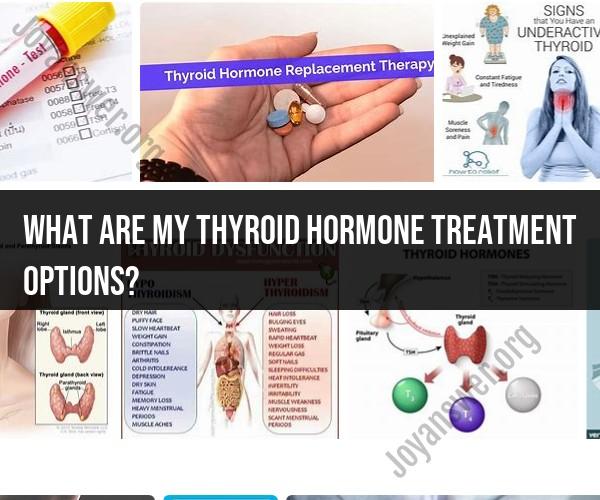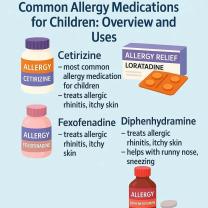What are my thyroid hormone treatment options?
Thyroid hormone treatment options depend on the specific thyroid condition you have. The two main thyroid conditions are hypothyroidism (an underactive thyroid) and hyperthyroidism (an overactive thyroid). Here are the common thyroid hormone treatment options for each condition:
For Hypothyroidism (Underactive Thyroid):
Levothyroxine (Synthroid, Levoxyl, Tirosint): This is the most commonly prescribed medication for hypothyroidism. Levothyroxine is a synthetic form of the thyroid hormone thyroxine (T4). It helps replace the missing thyroid hormone and regulate your body's metabolism.
Liothyronine (Cytomel): In some cases, a combination of levothyroxine and liothyronine may be prescribed. Liothyronine is a synthetic form of the thyroid hormone triiodothyronine (T3).
Natural Desiccated Thyroid (NDT): This medication is derived from the thyroid glands of pigs and contains both T3 and T4 hormones. It's used by some individuals who prefer a more natural thyroid hormone replacement option. Examples include Armour Thyroid and Nature-Throid.
Compounded Thyroid Hormones: Some patients may work with compounding pharmacies to create customized thyroid hormone formulations tailored to their specific needs.
For Hyperthyroidism (Overactive Thyroid):
Antithyroid Medications: These medications help reduce the production of thyroid hormones by the thyroid gland. Common antithyroid medications include methimazole (Tapazole) and propylthiouracil (PTU).
Radioactive Iodine (I-131) Therapy: Radioactive iodine is taken orally and is absorbed by the thyroid gland, where it destroys the overactive thyroid cells. This treatment is often used for Graves' disease and hyperfunctioning thyroid nodules.
Thyroid Surgery (Thyroidectomy): In some cases, surgical removal of part or all of the thyroid gland may be necessary, especially if other treatments are not effective or are contraindicated.
Beta-Blockers: These medications, such as propranolol, are not a direct treatment for hyperthyroidism but can help relieve symptoms like rapid heart rate, tremors, and anxiety while other treatments take effect.
The choice of thyroid hormone treatment depends on several factors, including the specific thyroid condition, the severity of the condition, your age, overall health, and individual preferences. Your healthcare provider will assess your thyroid function through blood tests and may recommend one of these treatment options based on the diagnosis.
It's important to work closely with a healthcare professional, such as an endocrinologist or primary care physician, to determine the most appropriate treatment plan for your thyroid condition. Thyroid hormone replacement or management is typically a lifelong commitment for individuals with hypothyroidism, while treatment for hyperthyroidism may be temporary or ongoing, depending on the underlying cause. Regular monitoring and adjustments to medication dosages may be necessary to maintain thyroid hormone levels within the normal range.
If you have hypothyroidism, the most common type of thyroid disorder, your doctor will likely prescribe thyroid hormone replacement therapy. This involves taking a synthetic thyroid hormone medication, such as levothyroxine (Levothroid, Synthroid) or liothyronine (Cytomel, Levoxyl), to replace the thyroid hormone that your body is not producing.
There are two main types of thyroid hormone replacement therapy:
- Monotherapy: This involves taking a single thyroid hormone medication, such as levothyroxine.
- Combination therapy: This involves taking a combination of two thyroid hormone medications, such as levothyroxine and liothyronine.
Most people with hypothyroidism are treated with monotherapy. However, some people may benefit from combination therapy, such as those who have severe hypothyroidism or who do not respond well to monotherapy.
In addition to thyroid hormone replacement therapy, there are a few other treatment options for hypothyroidism. These include:
- Thyroid hormone extract: This medication is made from dried animal thyroid glands. It is not as commonly used as synthetic thyroid hormone medications, but it may be an option for some people who do not respond well to synthetic thyroid hormone medications.
- Radioactive iodine therapy: This treatment involves taking a radioactive iodine capsule. The radioactive iodine destroys the thyroid gland, which causes the body to stop producing thyroid hormone. After this treatment, people with hypothyroidism will need to take thyroid hormone replacement therapy for the rest of their lives.
- Thyroid surgery: This treatment is typically only used if other treatments are not effective or if the thyroid gland is enlarged or cancerous. After this surgery, people with hypothyroidism will need to take thyroid hormone replacement therapy for the rest of their lives.
Your doctor will work with you to determine the best thyroid hormone treatment option for you. They will consider your individual needs and preferences, as well as the severity of your hypothyroidism.
Here are some additional things to keep in mind about thyroid hormone treatment:
- Thyroid hormone replacement therapy is a lifelong treatment for most people with hypothyroidism.
- It is important to take your thyroid hormone medication exactly as prescribed by your doctor.
- You may need to have your blood levels of thyroid hormone monitored regularly to ensure that your medication is working properly.
- Thyroid hormone replacement therapy can interact with other medications, so it is important to tell your doctor about all of the medications and supplements you are taking.
If you have any questions about thyroid hormone treatment, be sure to talk to your doctor. They can help you understand your options and choose the best treatment plan for you.













